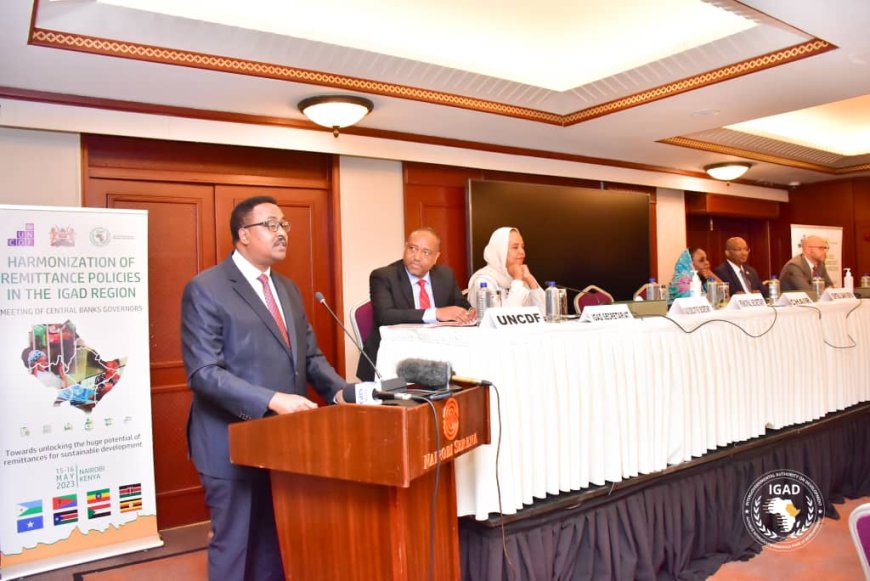IGAD to harmonise regional remittance policies across its member countries

Nairobi, Monday, May 15, 2023
KNA by Joseph Nga'ng'a
The Intergovernmental Authority on Development (IGAD) in partnership with the United Nations Capital Development Fund (UNCDF) and Governors of Central Banks from member states are seeking to harmonise remittance policies across member countries.
The partners have organized a two-day forum themed ‘Unlocking the potential of remittance for sustainable development’ whose aim is to discuss opportunities that promote remittance policies and regulations offering deeper financial markets, streamline supervision, implementation of cost and opening service access thus foster economic growth.
The forum being held in Nairobi also seeks to explore the timelines and performance indicators through smooth inflows of remittances within and to the region which will curate actions to reduce impacts of the challenges faced by aligning similar laws, regulations and standards.
Speaking on Monday during the forum, IGAD Chair Ambassador Rahma Salih said that the IGAD region is characterised by high mobility noting that an estimated over 9.5 million people which represents over 4 percent of the region’s population are always on transit.
Salih pointed out that migration and development are closely interlinked stating that migrant remittance is an integral factor which has immediate effect in the recipient countries particularly poverty reduction, raising living standards, establishing small businesses and providing additional employment.
She reiterated that in accordance with article seven of its establishing agreement IGAD undertook several initiatives to maximize the use of remittances in favor of economic integration and development.
“Global migrants’ remittance is estimated to be over $770 billion while in 2021 the IGAD region approximately had a remittance of $9 billion. In spite of this tremendous figure the remittances inflow is yet challenged by many factors such as natural disasters, economic slowdown, the Ukraine war, internal and cross border conflicts and Covid-19 pandemic,” anchored Salih.
The IGAD Boss reiterated that an enhanced effort is certainly needed to overcome these challenges as well as maximize the benefits of remittance in favor of social and economic development in the countries.
Salih added that IGAD’s road map seeks to support regional measures like establishing common policy standards, initiate regional vision, identify progress made and shortcomings in addition to guaranteeing appropriate and secure remittance inflows.
Echoing her remarks, IGAD Executive Secretary Workneh Gebeyehu said that remittances play a crucial role in regional economic development serving as both a financial parachute and fiscal safety net for our region that is vulnerable to conflict and natural hazards that is drought, climate change and Covid-19. Gebeyehu added that remittances are a vital source of income for many families in the region providing them with essential funds for daily expenses.
According to the World Bank, remittances to low and middle income countries reached a record of $ 540 billion in spite of the disruption by Covid-19 on the global economy. In its recent studies, around 281 million people representing 4 percent of the world’s population live outside their country of origin.
“IGAD region still received a high level of remittances amounting to $8.1 billion in 2021 which accounted for 3 percent of the region’s Gross Domestic Product (GDP) despite the economic slowdown from the pandemic,” remarked Gebeyehu.
Gebeyehu stated that remittances are the reflection of us investing in ourselves and each other, however despite their significant importance the cost and volumes of sending money to the IGAD region are still high compared to other parts of the world.
Further, he stated that many remittances sent via informal channels through friends and families are often unregulated, expensive and risky exposing both the senders and recipients to fraud and exploitation.
“We strongly believe that Central Banks in their capacity as the principal financial regulatory institutions are instrumental in promoting the development of enabling remittance policies, eliminating inhibitions and disincentives as well as ensuring the inflow of diaspora and migrant work remittances to our region is smooth ,affordable, safe ,accessible and reliable,” said Gebeyehu.
Simultaneously, Central Bank of Kenya (CBK) Governor Dr Patrick Njoroge remarked that the average cost of sending remittances to the IGAD region is 8.9 percent compared to the global average of 6.5 percent and this is nearly three times the sustainable development goals target rate of below 3 percent.
Njoroge expressed the need to digitize data to offer better, informed decision making policies and promote accessibility of remittances anytime or anywhere thus lowering cost noting that intra-regional remittance transfer among its members stands at 10.6 percent which is significantly higher.
Courtesy; K.N.A
What's Your Reaction?
































































































































































































































































































